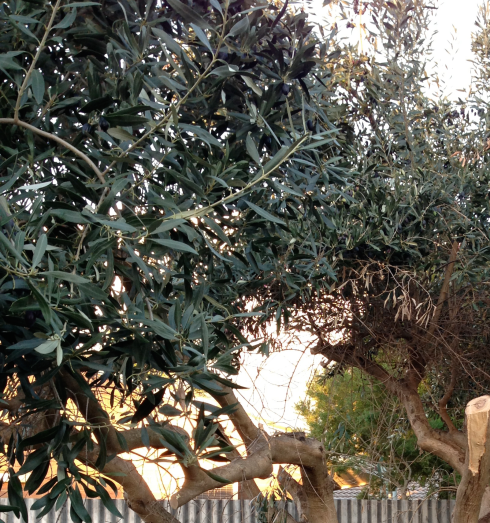Sharing Sunday – Olive Branch
So I’ve decided that Sunday is now going to be called Sharing Sunday and I’m going to make a practiced effort to share bits and pieces of my writing with you. That and Sunday’s generally tend to be the days where I schedule everything around Body Attack and So You Think You Can Dance, but it’s now moved to Thursdays (really annoyed about that this week. I was looking forward to it!) Any way without further chatter from me here is Olive Branch. My first toddler steps into creative non-fiction aka literary fiction. I hope you like it. It’s also a bit long, so bear with it.
Olive Branch
His name was Panagiotis George Kontos – a name that was passed down through the men in my family. My Pappou was a great man, taken from my life when I wasn’t ready for it. It’s left a hole in my soul, one so deep that it’s taken me a year and a half to climb out. Writing has helped ease the pain but it still lingers when I think of Pappou. He left me when I needed him the most and took my words with him and for the first time since I’ve finally come to terms with what I need to say.
Pappou never cried. He didn’t show hurt. Complaints were made playfully and he always had a smile on his face. After walks his pockets would be full with items of fascination: pens, jewellery and broken gadgets – but he was never broken.
On the last day of spring in 2011, he lost his fight since he’d relapsed with cancer.
A relapse that broke everyone.
Pappou had an infectious laugh, a greyed moustache and eyes that were as blue as the Mediterranean sea. He’d been hiding a secret from his grandchildren: ten years ago he had battled with prostate cancer and won. When he was re-diagnosed with cancer, our family crumbled.
My cousins and I grew up oblivious that he battled with his murderer before. We’d have been too young to understand anyway. So many regrets come to mind when I think about the last ten years. I could have spent more time with him, I could have listened to him more. I could have stopped being such a pain in the arse; I could have… I can keep going until my fingers creak from old age, but it will never change. I should have spent more time with him.
The day before he was admitted back into hospital the family sat at the table with him, his head drooping and hands shaking as he tried to be present to the conversation. I was unsure whether the positivity I had held so tight would hold up – I wanted to cry as it came crumbling down. How could this strong man be reduced down to a disease?
‘You’re going to Melbourne next week?’ The question took nearly ten minutes to ask.
‘Yes Pappou, Dad and I are going on the fifth to check everything out.’
‘Good, good. You have to go.’
I promised to tell him all about it when I came back.
His funeral was held the day I was set to take the trip to Melbourne.
His white fanella was left on the rocks with our towels while Yiayia made sure we were all slathered in sunscreen and ready.
‘I’ll beat you,’ he says to me and Peter, my younger brother.
‘No way Pappou, we’ll beat you.’ I say.
‘No, I will beat you.’ Peter counters.
There is no rush to get to the water, Yiayia makes sure we take our time and gathers up her skirt in one hand as soon as the water covers her ankles. Peter and I dive under the surface and try to catch up to Pappou, but he’s too far away and we’re too little. I could never beat him.
‘Pappou, why do we go to the beach in the mornings?’
‘Well,’ he says in his thick accent, ‘It’s better because there are not very many people around and before it gets too hot. The water is good for everything.’
‘Everything?’ I ask.
‘Yes, the salt in the water can heal everything.’
If it healed everything then why couldn’t it heal him?
Pappou was never too busy for us. He would always come to the rescue no matter what happened. At a day’s notice he was always ready to take any member of the family where they needed, he was there for the hard moments when everything was too much and was as strong as a support beam. He was also there for the good. Always present at graduations and award night. As long as he could drive us to a destination he was always there. He even made sure of it, and when his car broke down, he made sure I got home after school while he struggled to fix it.
In 1954 he migrated from Greece to Australia. He didn’t know which side of the road he had to drive on; he didn’t even know the language. While he waited for his cousin and best friend to join him in Australia he was lost, confused and unable to do much about his situation. But that didn’t stop him. Pappou was lucky to find a cafe owner that spoke Greek, he helped to ease his anxiety with a few simple words and good coffee. The cafe owner was the same man who introduced him to Yiayia. Pappou and Yiayia knew each other for a week before they were married and lived together for fifty-four years.
There were times when things weren’t always happy, but Pappou held Yiayia up high. At her lowest of points in her life she relied on him. He took over and cleaned when she couldn’t, cooked when she couldn’t muster the strength to get out of bed and hung out the washing when she was sleeping. Pappou was the pillar she could lean against when things were dark and hazy, he brought fruit to a dreary situation just like an olive tree did at harvest.
My fingers brushed over the blue pin pad of the telephone with familiarity. I had Pappou and Yiayia’s number memorised by the time I was eight. It was Tuesday night and I called Pappou to ask for a lift to school the next day. I did this every Tuesday but he would always remember.
‘Hello?’
‘Hi Yiayia, how are you?’
She laughs, ‘Hello Tsitifrika.’ She says in a cheeky tone. She always calls me little girl.
‘Yiayia, how are you?’
She laughs at me again, ‘How are you?’ she asks.
‘I’m good. Is Pappou there?’ If I keep trying to ask her how she is I will never talk to Pappou!
‘Yes, I’ll get him.’
In the background I heard her ask for him, her nickname for him is Poti.
‘Allo?’
‘Hi Pappou. How are you?’
‘Good, good, you?’
‘I’m good, Pappou.’ I pause for a moment. ‘Um, can you pick me up from school tomorrow.’ I say in Greek, I practiced saying it perfectly so I could get it out, but my heart is still hammering in my chest. ‘If you’re not busy.’ I add.
‘Ahh, I can do that.’
I sigh. ‘Thanks Pappou. I’ll see you at 10:30.’
‘Okay, I’ll see you tomorrow.’
‘See you Pappou.’
I hang up. Tomorrow I’ll see Pappou and he’ll tell me a new story.
The last few hours of someone’s life, especially Pappou’s life, aren’t always happy, they’re not even funny. It’s like their spirit knows that they’re going and it gives you a false sense of security. Our tiny family (we’re Greek, known for casing havoc on a mass level) crowded into a room to spend Pappou’s last moments with him. The staff at the hospital were kind enough to give us the room with the most privacy. For the first time in hours, Pappou cracked his first joke a couple hours shy of midnight.
‘Someone get me my walking stick, I’m leaving.’ He said.
Everyone was so shocked that it took us a moment to realise that all he wanted was his bloody walking stick. He never went anywhere without it and he would always threaten to wrap it around our necks, like they did in cartoons, and drag us over if we weren’t listening to him. Just like the Mickey Mouse, he would say, even if the program ad nothing to do with Mickey.
‘Oh my god. Do you know how rare it is to see these?’ I say as I hold up a one hundred dollar bill.
‘It’s just green.’ Pappou says to me.
‘But you don’t see them often Pappou. I’m going to keep one and bank the others.’ It’s my 21st birthday and as a present Pappou gives me five hundred dollars. Five green hundred dollars.
‘The banks stopped making them.’
I stare at him and he has a cheeky smile on his face, ‘Pappou, don’t lie. From now on all I want for my birthday is green, green.’
‘Okay, I have lots. Go outside and pick it.’
‘Pappou! I’m not talking about the hortari.’ I want money, not grass.
Greeks are loud by nature. I always had some kind of noise in the background, but with the passing of Pappou it meant that things had to change. The mourning had to start. For the first time, I had to face silence.
When it comes to Greek religion, grieving processes take on a different meaning than much of Australian culture. Bright colours and the oncoming summer were forgotten, and swapped for dark and dreary blacks. Music was switched off, TV was considered a distraction and endless amounts of Turkish coffee, brandy and paximadia (double-baked dunking biscuits) were bought out.
In the days leading up to the funeral (we had to wait five agonising days to lay him to rest) the news spread through the family and one by one, they all turned up to what was now known as Yiayia’s house. Not Pappou and Yiayia’s. Cousins, distant cousins, friends, neighbours and godparents came to pay their respects to Pappou. Jars of coffee were bought over by relatives to replace the coffee that was used and pay their respect, they were stored in the spare room, and bottles of brandy never left a shot glass dry. Water filled up glass after glass to chase the bitter taste of the coffee from tongues and paximadia would jump out of bowls and into waiting hands ready to dip.
‘Zoi se sas.’ — may life be granted to you. This was a common phrase that left the lips of everyone who stepped into the house and it reminded me of working at McDonald’s where hoards of angry birds would come to scavenge food. With three brikis of coffee going at once and shot after shot of brandy burned down my throat. I was fighting through in a numb haze and I went into autopilot. Smile, greet, talk, repeat.
In the old days relatives would also bring food for the family to eat. It was said that because they were so stricken by grief they wouldn’t be able to cook for themselves and instead of relying on store bought food, relatives brought us food to eat. There was spanakopita, tyroptia soup, seafood marinara and rice. Leftovers were many and were eaten the next day or the next, along with junk food that was bought to keep our energy levels high for every wave of family that turned up.
Pappou’s death meant that celebrations for the next forty days were going to be low-key. This included Christmas, New Years and my birthday. The immediate family wouldn’t have music, cakes and certainly no colours.
The days would move slowly, and after ten days there would be a blessing at the grave site, the kollyva – a mixture of boiled wheat prepared with sugar, almonds, cinnamon and sultanas – to be served with bread and water. And then again at the forty days this would happen only we would be called back into the church, dressed in black and sitting in the front pew, we would see Pappou’s name on the church’s kollyva which was covered in thick white icing.
‘Pappou, moustaki, thelo moustaki.’ Moustache, I want a moustache, I say as I climb onto his lap. Pappou holds a glass of beer in his hand.
He laughs, ‘Alright, alright.’ He holds up the glass to my lips and I grin as I press my lips against the rim. The drink tastes disgusting but it doesn’t matter, all I want is the white foam that it leaves behind. Then I can be just like Pappou and have a moustache.
But it doesn’t stop with me. Peter is next, and then my cousins Mundo, Foti is too young to do anything but stare at us from her high chair.
Mum yells at Pappou not to do it, but Dad and my uncle are too busy laughing. Pappou likes us the most if he lets us have moustaches like him.
Pappou bought the house that Yiayia now lives in with his own money, he made it a home and he and Yiayia left their mark on it with pictures, flowers and little knick-knacks that were an essential part of growing up. Yiayia felt that Pappou needed to be in the house one last time before we buried him. I’d never seen a dead body before I saw Pappou and it was alarming to see his skin paler than normal his hair looking duller than usual and never getting the chance to see his eyes open again. The most heart breaking moment of all was to see Yiayia shake him in an attempt to try and wake him. She cries, ‘Poti, wake up, your grandchildren are here. Wake up for them. Come on Poti.’ Tears welled in our eyes and each one of us four held onto the other hoping that she’d stop because she was making us cry before we got to the church, before we could get to the see everyone. Red puffy eyes would be all that our friends and family would see.
Maybe it’s because Yiayia insisted that Pappou spend an hour in the house before we buried him, the house never seems empty. Maybe that was why whenever we sit in the room alone at night, doing out own things, display plates fall off the curtain stand, not once, but twice so that the plate is now left down so it doesn’t fall. Or for the fact that we hear random doors shutting, even his voice fills our ears. Pappou is still with us in the house and I like to think that he is trying his best to look out for Yiayia, he’s trying to be the one who she can depend on. Every night she leaves a glass full of water in hopes that she’ll wake up and find some of it gone, like he’s there while she sleeps.
Pappou’s soul drank the water for the five days we had between his death and burying him. The proof in the glass as the morning broke, the liquid sunk. He lingered where we couldn’t see or hear him but he watched us. He’s still watching us and I hope that I’ve made him as proud as I am to be his eldest granddaughter with the words to finally get down what he always wanted. His story.
Just as a side note. I left a copy of the rough draft of this at Pappou’s grave when I wrote it and I expected the rain to wash it away before anyone got to it but my Yiayia got to it first and took it from the grave and wrapped in plastic. It wasn’t until I was back in my dorm room that they even found it though and they questioned why I didn’t wrap it up in the first place. Ahh the little joys in life.
I’d love to have some of you send me stories to share. Think you can be brave enough to do so? Hit me up in the comments and we can organise it!







11 Comments
fayann
This is beautiful hun! Thank you so much for sharing….I have grandparents who are the core of my heart, and my love for them transcends words, you had an awesome Pappou, and you should write this story love,
from a blogheart, Xx 🙂
Mandi
Ahh thank you, Fayann! It one of the toughest pieces I’ve ever had to write and cried through a lot of the drafts and was extremely terrified to give a draft of this to my class last year, but I love how it turned out. x
fayann
Its just perfectly written and I know exactly how you feel! Well done hun, and keep writing 🙂 x
Wendy Ray
Mandi, that was so beautiful, what a gift you have to be able to express it so eloquently. Look forward to reading some more of your amazing stories.
Mandi
Thank you, Wendy!
Av
Mandi, this was absolutely beautiful. Very well written, evocative and full of heart-aching love. Well done! xx
Mandi
Oh Av! Thank you. Now can I totally bug you for one of your stories to share, yes? 😀
Av
I don’t have any non-fiction, literary, creatives ones though. 🙁 And it’s okay. I’ve missed your writing. xx
Mandi
I want creative! I want all of them! Even poems and songs! I’m taking anything! I miss being in class with you!
Av
I miss you and your effervescent more.
I’ll see what I can come up with. Do you mind if I post it on my blog—does WordPress have a post tagging option? XD
Mandi
It doesn’t have a tagging system. I find that sad 🙁 can I pinch it off your blog. I plan to have a link to your blog and steal a mini bio off it if I post it up!